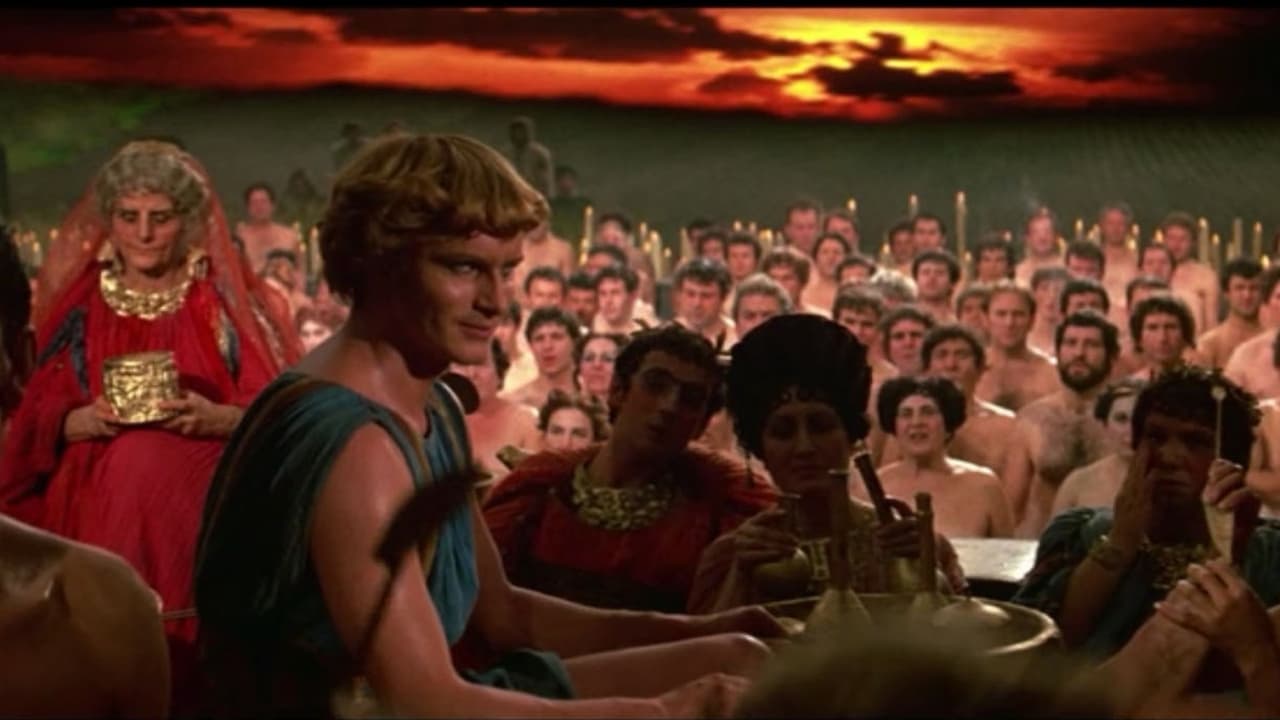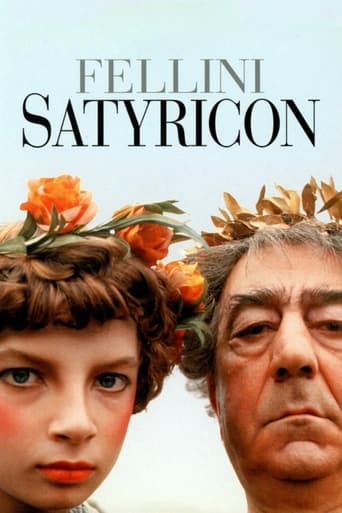ath_steph_3000
Although this is clearly not one of Fellini's best rated movies, "Satyricon" is a fantastic modern science-fiction drama that is certainly worth seeing. It is true that the story lacks a red line, a plot that clearly interconnects each scene or scenario. However, if one watches it carefully enough and with an open mind, there is a story-line and character development in it. It is the life passage of a young man (Encolpius) and his friend and antagonist (Ascyltus), former gladiators who were taken to a foreign island and undergo diverse colorful, partly erotic adventures in dream-like sequences and images. You will find action in each scene but, more than that, Fellini is probably the only director who has managed, with this film, to create an understanding of what life in ancient Rome MAY have been like for the lower and middle-class ordinary civilians. Far from the bombastic installations as we know them from DeMille's monumental films, this is an abstract piece of art that deserves to be called a masterpiece that leaves room for interpretation and speculation about Petronius' ancient novel.
david-sarkies
I really don't know what to make of this film because in one way it seems to be incredibly disjointed, pointless, and apparently going nowhere, but in another way the scenes are beautiful, intense, and clearly the work of a master film maker. It has been suggested that some people rate this film highly simply because it was made by Fellini, and as such is carried through simply by the name of the director. I would have to disagree with that suggestion because people who make this suggestion clearly do not understand what it being done in this film. In fact, I have to admit that I really do not understand this film either, but a part of my wants to watch it again in an attempt to do so, however I feel that I will need to read the book that it is based upon first.The interesting thing about this film (with the exception that my DVD had the film in Italian, French, German, and Spanish, but for some incredibly bizarre reason, not in English) is that the book that it is based upon is not extant. What I mean is that the Satyricon is an Ancient Roman novel in which half of the book simply did not survive, which results in a story that is basically disjointed and incomplete. It is not that the book ends half way through either, it is that we simply only have sections of the book so if you were to read it you would find yourself jumping constantly and pretty quickly getting lost.Fellini, in making this film, decided that he would pretty much follow the book in that way, and not actually try to fill in the missing pieces. When I watched the film initially I didn't actually realise that he had done that, and found myself quite baffled at what was going on, and when I discovered that he had decided that he would actually not attempt to fill in the gaps, the theory behind the film actually made a lot more sense.I have noticed that some Christian commentators have pointed at this film as an example of how we as a race (that is Western Europeans) have lost touch with the spiritual realm and have found ourselves in a society that is based purely on the physical and as such have discovered that society is in fact disjointed, pointless, and meaningless. If that is the case, then Fellini has made a brilliant piece of filmography that pretty much captures the sense of our society and our modern mindset.The two parts of the film that stand out is the feast and the slave ship, and I liked those parts simply for the way those scenes were put together. However what is interesting is that on the slave ship there is a wedding between the captain of the ship, and the protagonist of the piece (both of them being male). What we have in that scene is a sense that society has simply become completely inverted. Okay, with the debate regarding gay marriage running around society it is not something that stands out to us now, but back when the film was made it would have – in a sense what we are seeing is a society that has not so much collapsed, but rather lost its identity as it travels through history grasping at straws and finding that it is forever failing in the task of seeking out its new identity.
ElMaruecan82
If a filmmaker's appeal were solely based on seduction, then Federico Fellini would epitomize the expression "hard to get". Still, what a relief when we finally 'get' him! I remember a few years ago, my first intended immersion into Fellini's universe was through his groundbreaking "8½". As a result, I waited one year and half before giving a second chance to Fellini. This is how disappointed I was, maybe less by the film than by my inability to claim that Fellini was an avant-garde genius. I guess I dived too brutally in cold water, while I should have approached it step by step. I started then with his neo-realist period, and after "Nights of Cabiria" and "La Strada", my heart was conquered and the rest of his oeuvre, including "8½", confirmed my feelings that Fellini was on the field of emotions what Ingmar Bergman was on human psychology, essential to Cinema and complementary like libido and psyche for humans. And through the most libidinous "Satyricon", Fellini signs the most defining of all his films. And defining is the right word, because from our perspective, it means that Fellini's detractors would certainly pick "Satyricon" as a proof of Fellini's self-importance, while his adulators will consecrate it as the quintessential artistic expression of a genius, who was the mirror of human's most pervert yet fascinating sides. But let me be the devil's advocate, when talent can allow such magnificent deviations, it can afford pretentiousness, which in Fellini's case, is never a posture, but a risk-taking dynamic tunneling us into our most repressed sensations. Still, all through "Satyricon", I kept wondering how much time I would have waited before giving the 'second chance' had I seen it first. The film is a hyperbolic depiction of whatever Fellini stood for, a universe made of freaks, weird, funny-looking characters, debauchery, boredom, sexuality, amorality, poetry, blood, gluttony, feast and fantasy, as nonsensical and unsettling as they could get in the mind of the most twisted of us all. But it takes Fellini's genius to transcend the inner ugliness of humans and make such a cinematically significant movie. As I said for "La Dolce Vita", the morally worst can bring the aesthetically best."Satirycon" was loosely based on a poem from Petronius, a writer who lived under the reign of the lunatic Emperor Nero. The poem, discovered a few centuries ago, was made of disjointed fragments, the perfect format for the director who, since "La Dolce Vita" and before "Amarcord" cherished movies' structure made of independent little vignettes. The Fellinian experience is like a trip in a dream-like universe, when episodes don't need a connection to have relevance, where characters are defined by their mythological, mystical and sometimes physical attributes rather than any psychological notions or plot devices. And like a perfect dream-like escapism, the dazzling cinematography made of purple skies and splendid combinations of lights and shadows, reinvents the settings of Antic Roma in its most decadent days, before Christianity would set a new tone, when lifestyle was made of weird and bizarre distractions meant to conceal life's suffocating boredom. The film is made of one stunning sequence after another, and will probably be most remembered for the unforgettable orgy in Trimalchione's house, a sort of trip in an Antic world that never seemed as modern. And we hypnotically follow him as if we sensed a cathartic effect in this orgy of excesses, succumbing to devilish voyeurism to better expiate from our lowest impulses, just as Peckinpah's use of excessive violence in "The Wild Bunch". "Satyricon" is a journey in a world where normality is meaningless, where beauty is asexual, and sex is ugly, but both so appealing. A world where everything is corrupted and even poetry is traded for honors, food and fun. "Satyricon" is moral corruption is like a form of salvation as if it extrapolated Fellini's own impulses, own desire to dare such shots for the sake of digression. And it works because Fellini is pretentious but not self-important, his excesses create a coherence that makes the calmer and ordinary moments more awkward. Two men marry together, a beautiful black woman ignites fire from her vagina, a slave has his hand cut-off to entertain a hysterical audience in a theater, and we have no choice but to plunge in the lowest parts of humanity, like the abysmal depths of Pompeii before its imminent explosion."Satirycon" is beyond any explanations, and a real challenge for criticism. It is an Odyssey in a Roma that probably never existed, but had all the predispositions to allow Fellini to project his inner demons and most pervert fantasies into it, the universe created is unsettling but had it tried to be normal, it would have been a disaster just like Visconti 's "The Damned", released the same year. The film was as bizarre, as unsettling, but its realistic setting made the experience confusing by trying to battle in too many fronts of our perceptions. What a year for filmmaking anyway, released in the summer of love, "Satyricon" is the exaltation of freedom, it embraces the total zaniness of its project and therefore belongs to the category of 'films victims of their own greatness'. I used the same terms for Stanley Kubrick's "A Space Odyssey" and John Cassavetes' "Husbands", the movies convey the very feelings that inhabit the director's heart, illustrating in the form the point made by the content and transmitting it to the audience, at a time where cinematic creativity was at its peak. Watching "Satyricon" made me regret the crowd-pleasing aspect of today's cinema. And Fellini didn't give a damn about pleasing crowds: as a true author, he created immortal classics. Not that I'm planning to watch the film again, not that I believe it's a masterpiece, but it's a film of guts, of images and entertainment, sitting majestically on the throne of its ugliness, above our boring prudishness.

